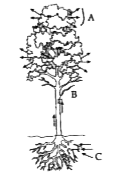What are essential elements in plant nutrition? Explain the role of any three of them.
Step-by-Step Solution:
1. Definition of Essential Elements in Plant Nutrition:
Essential elements are the nutrients required by plants for their growth and development. These elements are crucial for various physiological processes, and their deficiency can lead to diseases and impaired growth in plants.
2. List of Essential Elements:
Some of the essential elements required by plants include:
- Nitrogen (N)
- Phosphorus (P)
- Potassium (K)
- Magnesium (Mg)
- Boron (B)
- Zinc (Zn)
- Iron (Fe)
- Molybdenum (Mo)
- Nickel (Ni)
- Copper (Cu)
3. Role of Three Essential Elements:
- Potassium (K):
- Potassium is vital for the opening and closing of stomata, which regulates gas exchange and transpiration in plants.
- It aids in the translocation of sugars within the plant, ensuring that energy is distributed where needed.
- Potassium is also important for protein synthesis and the activation of various enzymes that facilitate biochemical reactions.
- Phosphorus (P):
- Phosphorus is a key component of nucleic acids (DNA and RNA), which are essential for genetic information and protein synthesis.
- It plays a crucial role in the formation of coenzymes, which are necessary for various metabolic processes.
- Phosphorus is involved in the formation of sugar phosphates, which are important in photosynthesis and energy transfer.
- Magnesium (Mg):
- Magnesium is the central atom in chlorophyll, the pigment responsible for photosynthesis. Without magnesium, chlorophyll cannot capture sunlight effectively.
- It is also important for the activation of many enzymes involved in metabolic processes within the plant.
- Magnesium helps in stabilizing the structure of nucleic acids and is involved in energy transfer processes.
Essential elements are the nutrients required by plants for their growth and development. These elements are crucial for various physiological processes, and their deficiency can lead to diseases and impaired growth in plants.
Some of the essential elements required by plants include:
- Nitrogen (N)
- Phosphorus (P)
- Potassium (K)
- Magnesium (Mg)
- Boron (B)
- Zinc (Zn)
- Iron (Fe)
- Molybdenum (Mo)
- Nickel (Ni)
- Copper (Cu)
- Potassium (K):
- Potassium is vital for the opening and closing of stomata, which regulates gas exchange and transpiration in plants.
- It aids in the translocation of sugars within the plant, ensuring that energy is distributed where needed.
- Potassium is also important for protein synthesis and the activation of various enzymes that facilitate biochemical reactions.
- Phosphorus is a key component of nucleic acids (DNA and RNA), which are essential for genetic information and protein synthesis.
- It plays a crucial role in the formation of coenzymes, which are necessary for various metabolic processes.
- Phosphorus is involved in the formation of sugar phosphates, which are important in photosynthesis and energy transfer.
- Magnesium is the central atom in chlorophyll, the pigment responsible for photosynthesis. Without magnesium, chlorophyll cannot capture sunlight effectively.
- It is also important for the activation of many enzymes involved in metabolic processes within the plant.
- Magnesium helps in stabilizing the structure of nucleic acids and is involved in energy transfer processes.
Topper's Solved these Questions
- MINERAL NUTRITION BOOK - ICSECHAPTER - MINERAL NUTRITION EXERCISE - TEST YOUR PROGRESS (HIGHER ORDER THINKING SKILLS QUESTIONS)
8 Videos
- MINERAL NUTRITION BOOK - ICSECHAPTER - MINERAL NUTRITION EXERCISE - NCERT EXERCISE WITH ANSWER
8 Videos
- MINERAL NUTRITION BOOK - ICSECHAPTER - MINERAL NUTRITION EXERCISE - TEST YOUR PROGRESS (VERY SHORT ANSWER TYPE QUESTIONS )
49 Videos
- LOCOMOTIONA ND MOVEMENT BOOK - ICSECHAPTER - LOCOMOTIONA ND MOVEMENT EXERCISE - NCERT EXERCISES WITH ANSWER (DIFFERENTIATE BETWEEN)
8 Videos
- MORPHOLOGY AND ANATOMY OF DIFFERENT SYSTEM OF COCKROACH BOOK - ICSECHAPTER - MORPHOLOGY AND ANATOMY OF DIFFERENT SYSTEM OF COCKROACH EXERCISE - Long Answer type Questions
6 Videos
Similar Questions
What is an essential element ?
View SolutionWhat is an essential element ?
View SolutionNumber of essential elements in plants is
View SolutionName an essential element absorbed by plant from air
View SolutionWhat are essential elements for plants ? Give the criteria of essentiality ? How are minerals classifieds depending upon the amount in which they are needed by the plants ?
View SolutionWhat are essential elements? How many elements are reported from plants?
View SolutionWhat are essential elements for plants? Give the criteria of essentiality. How are minerals classified depending upon the amount in which they are needed by the plants?
View SolutionAre some essential elements more important than others? Explain.
View SolutionAn outline sketch of a tree is shown in the diagram below. Study the same and answer the question that follo:

Explain the role of any three external factors that will increase the rate of this phenomenon.
View SolutionChoose correct options w.r.t. Essential elements for plant nutrition. (a) absolutely necessary for normal growth and reproduction. (b) Indirectly involved in plant metabolism. (c) All the essential elements are components of biomolecules. (d) The requirment of element is specific and cannot be replaceable by another element.
View Solution
